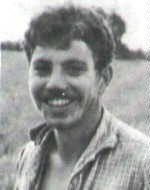Rand, Avner
Man and Rachel. He was born on the 11th of Tishrei 5710 (11.9.1950) in Kibbutz Evron. He grew up on kibbutz land and his childhood years were Simcha. From his childhood he had distinguished himself with special qualities: the ability to quickly absorb the world’s colors, places, and secrets. He was a walking encyclopedia and there was no end to his naive ambition. He had a childish maturity, the ability to relate to things in our world more maturely than his age. He studied elementary and high school studies at the “Ashrat” educational institution on the kibbutz. He was also a member of the Ha – Shomer ha – Tsa’ir youth movement. During his training in the movement and in the “roofless nest” of the Ussishkin neighborhood in Nahariya, he gathered a group of youths around him and quickly became their “gang leader.” He did not guide them according to the accepted methods, according to the “positive and negative commandments,” but invented a special, personal instruction that swept the boys after them. He was a social man, but although he was thirsty for a friend, active and active in his youthful society, Avner was self-absorbed and formulated ideas and opinions that he did not deviate from. More than anything he aspired to self-realization in the core of the sons of Kerem Shalom. Avner was drafted into the IDF in late January 1970 and joined the Nahal Brigade. In the days of his service, he attained the rank of sergeant, but on the 22nd of Nissan 5762 (July 4, 1972), he fell while fulfilling his duties and was brought to eternal rest in Kibbutz Evron. On his grave, one of the members said: “A visit to the house is meant to speak in our mouth, but his house in his mouth and thoughts was in Kerem Shalom (according to the testimony of his letters), where he quickly returned from the army, Until the fate of his life is curtailed by a decree of blind fate, in which he and his ilk have the potential of building a community, building a homeland. ” At the “Thirty” for his fall, a memorial service was held for him and his friends remembered Avner. One of them said: “Avner was always looking for the truth, the truth, the reliable he wanted the roots, the natural, the unmediated, without barriers and without wrapping.” Something concrete, real, If he thought otherwise, he would say so with the same candor – – – Avner loved an open, unlimited life, without fear and fear, and he was on the threshold, and on the threshold of compassion for the burden, while feeling freedom. After his fall, Kibbutz Evron published a booklet called “Avner” – containing the words of his friends and a series of letters he wrote.
